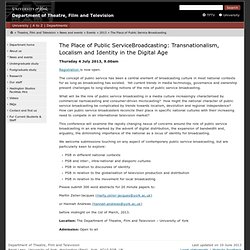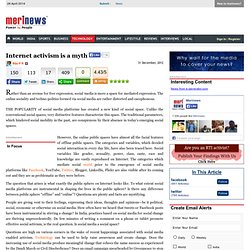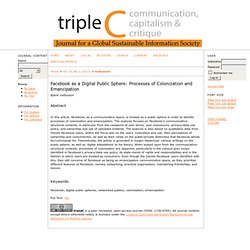

The Place of Public Service Broadcasting - Theatre, Film and Television. Thursday 4 July 2013, 9.00AM Registration is now open.

The concept of public service has been a central element of broadcasting culture in most national contexts for as long as broadcasting has existed. Yet current trends in media technology, governance and ownership present challenges to long-standing notions of the role of public service broadcasting. What will be the role of public service broadcasting in a media culture increasingly characterised by commercial narrowcasting and consumer-driven microcasting?
How might the national character of public service broadcasting be complicated by trends towards localism, devolution and regional independence? This conference will examine the rapidly changing nexus of concerns around the role of public service broadcasting in an era marked by the advent of digital distribution, the expansion of bandwidth and, arguably, the diminishing importance of the national as a locus of identity for broadcasting. or Hannah Andrews (hannah.andrews@york.ac.uk) Foucault and social media: life in a virtual panopticon. This is the first instalment in a three-part series.
Part 2. I tweet, therefore I become Part 3. The call of the crowd You start the day bleary-eyed and anxious. You stayed up late last night working on a post for your blog, gathering facts and memes from about the web and weaving them into an incisive whole. You jump on HootSuite and start sharing targeted content: Facebook for friends, tweets for professional contacts. How did we ever get by without social media? The French philosopher Michel Foucault (1926-1984) has a set of insights that can help clarify how social media affects us on a psychological level.
A Foucaultian perspective on social media targets the mechanism that makes it tick: sharing. ‘I sent this – it is part of my work. Foucault understood how being made constantly visible impacts on us psychologically. Bentham’s Panopticon, Foucault argues, functions to make prisoners take responsibility for regulating their behaviour. In sharing online, we are playing to a crowd.
Internet activism is a myth. However, the online public spaces have almost all the facial features of offline public spaces.

The categories and variables, which decided social interaction in every day life, have also been traced here. Social variables like gender, sexuality, power, class, caste, race and knowledge are vastly reproduced on Internet. The categories which mediate social world prior to the emergence of social media platforms like Facebook, YouTube, Twitter, Blogger, LinkedIn, Flickr are also visible after its coming out and they are as problematic as they were before. The question that arises is what exactly the public sphere on Internet looks like. To what extent social media platforms are instrumental in shaping the lives in the public sphere? People are giving vent to their feelings, expressing their ideas, thoughts and opinions—be it political, social, economic or otherwise on social media.
Everyday, tens of millions of people chat, text, email, poke, tweet, IM and Facebook. Facebook as a Digital Public Sphere: Processes of Colonization and Emancipation. Abstract In this article, Facebook, as a communicative space, is treated as a public sphere in order to identify processes of colonization and emancipation.

The analysis focuses on Facebook’s communicative-structural contexts, in particular from the viewpoint of user terms, user manoeuvre, privacy/data use policy, and ownership and use of uploaded material. The analysis is also based on qualitative data from Danish Facebook users, where the focus was on the users’ motivation and use, their perceptions of ownership and consumerism, as well as their views on the public/private distinction that Facebook allows for/commands for. Theoretically, the article is grounded in Jürgen Habermas’ various writings on the public sphere, as well as ‘digital adaptations’ to his theory. Keywords.